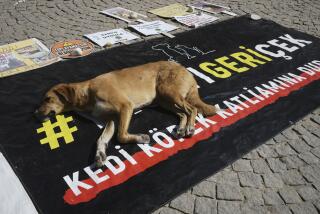German Group Pounces on Kurdish Cat ‘Eradication’
- Share via
VAN, Turkey — This nation’s powerful army has long been accused by Western rights groups of gross abuses in its 15-year battle against separatist Kurdish rebels. Since the rebels’ defeat last year, however, the allegations have diminished along with the Kurds’ demands for independence.
But now an obscure German group is charging that Turkish soldiers have launched a campaign to exterminate an endangered species of cat that lives in and around the remote eastern province of Van, bordering Iran.
Based in Duesseldorf and calling itself the SOS Van Cats Rescue Action, the newly formed group claims that during the past month alone, the Turkish military has “poisoned” as many as 200 of the cats, named after their native province.
“The Turkish state wants to wipe out everything that symbolizes Kurdish culture,” Florian Cremer, a spokesperson for the group, charged in a recent interview with the Turkish weekly Aydinlik. “The cats are Kurdish, and the Turkish authorities are unable to digest this.”
Experts remain divided on the origins of this exotic breed, which has snow-white fur and usually one blue and one green eye. It loves to swim in Van’s huge lake and is said to behave more like a dog than a cat. Local legend has it that the felines were part of Noah’s cargo and left the ark when the flood waters receded and the vessel came to rest on the peak of Mt. Ararat, about 100 miles northeast of the city of Van. Others say the breed evolved from an Egyptian strain brought into Van more than 3,000 years ago.
Now, apparently in response to the Germans, Turkish nationalists have been quoted in recent news reports as insisting that Van cats, like the latter-day Turks, came from Central Asia.
Denying the Kurds’ existence as a distinct ethnic group and repressing their culture has been state policy since the founding of the Turkish republic more than 70 years ago. Until 1991, Turkey’s estimated 12 million Kurds were forbidden to use their own language in public. Today, as Turkey readies itself for membership in the European Union, leading Turkish politicians have been taking turns acknowledging what a former president, Suleyman Demirel, described as “the Kurdish reality.”
Claims that the Turkish army is slaughtering the cats because they are Kurdish are ridiculed even by the army’s harshest critics here. And nowhere do they provoke more scorn than at a recently established center at the local state university that is seeking to rescue the breed from extinction. According to Zahit Agaoglu, the professor running the project, the local governor and military officials contributed generously toward the construction last year of a large cat shelter on campus.
“That the Turkish army would be able to find 200 Van cats, let alone poison them,” Agaoglu said in a recent interview, “is utter nonsense.”
When the center opened six years ago, it started with only a handful of cats. Today its feline population has grown to more than 120. Sales of the cats are strictly forbidden, and new laws say they cannot be taken outside Turkey.
“Our aim through selective breeding is to create the perfect Van cat,” explained Hasan Akkan, a veterinarian working at the center, “and to build up a well-stocked Van cat sperm bank.”
In a strategy aimed at identifying members of the breed throughout Turkey, the center organizes Van cat beauty contests, issues “identity cards” and offers free veterinary services to anyone who brings a cat to the center. The main difficulty, according to Agaoglu, is raising funds to feed the cats, who usually make do on rice and bean leftovers from the campus cafeteria.
“Instead of making fantastic statements,” he said, “it would be nice if the Germans sent us some cat food.”
More to Read
Sign up for Essential California
The most important California stories and recommendations in your inbox every morning.
You may occasionally receive promotional content from the Los Angeles Times.













